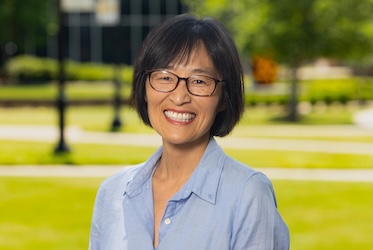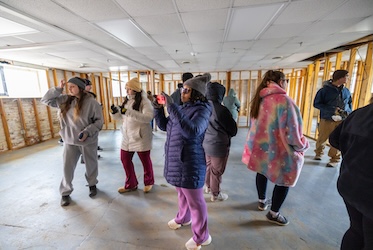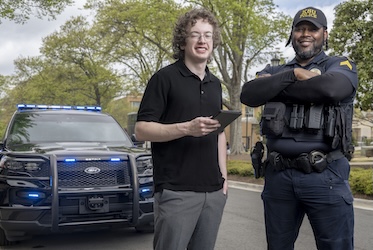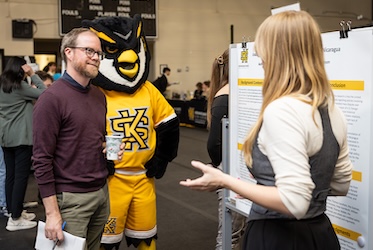
Kennesaw State receives $2.5 million grant to foster student success in calculus
KENNESAW, Ga. | Jan 2, 2024

The National Science Foundation awarded Kennesaw State a $2.5 million interdisciplinary grant for a project being called “Calculus for All.” The thought behind it is relatively simple – if students are exposed to concepts of calculus in high school, they stand a better chance of passing calculus classes in college and can pursue STEM-related careers. Brian Lawler, professor of mathematics education in the Bagwell College of Education, is the lead researcher on the project.
“We're saying we can teach calculus differently, so more students have a positive image of their ability and say, ‘I can do this,’” Lawler said.
Another professor involved is Alan Shaw, associate professor of computer science in the College of Computing and Software Engineering. He believes the No. 1 reason students move away from STEM-related careers is because they can’t pass their calculus classes in college.
“If a student has never been exposed to calculus in high school, they typically aren’t prepared to do well in STEM fields in college,” Shaw said. “A lot of times, that affects minorities and women more. If we can introduce, for example, the concepts of derivatives and integrals to high school students in Algebra 2 classes, then when they get to college, these calculus classes aren’t so brand new and overwhelming.”
Kennesaw State is partnered with the Algebra Project and the National Society of Black Engineers on this grant. Starting in the 2024-2025 school year, the curriculum for the algebra 2 course at McEachern High School in Cobb County as well as at a high school in Boston will be revised to introduce concepts of calculus. The grant uses the “near-peer mentoring model” meaning engineering students in the age range of 20-21 will be in the classroom at McEachern to work with the high school students.
Roneisha Worthy, assistant chair and associate professor in the Southern Polytechnic College of Engineering and Engineering Technology, is passionate about the concept.
“The innovative approach to this is that it’s not grounded in the way that calculus has traditionally been taught,” said Worthy. “Calculus is the pathway into engineering. We are providing professional development for the teachers to teach this. We are bringing in support through the college math literacy workers. We are paying these teachers extra through the grant, because the funding would otherwise not be there to support them in this endeavor.”
Shaw says the grant shows that Kennesaw State is breaking new ground in bringing computer science, math, and education together. He said the monetary value of the grant is so large because it “ultimately deals with the systemic barriers for success and racial equality in STEM.”
“I went to Harvard and MIT and I just didn’t see a lot of other black students there, so I have a passion to want to broaden that pipeline – to bring more students of color into this field of academia,” Shaw said. “To get into STEM fields, it requires learning math in ways that are accessible to people of all backgrounds. My three boys have African American parents who have advanced degrees, a computer scientist and a lawyer, and one son went to Harvard, one went to MIT, and one went to Dartmouth. But, if you’re in a family that doesn’t have that background, we must figure out how to get STEM to work for you.”
Worthy says this three-year grant should be seen as a student success initiative.
“It’s the students doing most of the heavy lifting here,” said Worthy. “In the end, we hope people remember that innovation comes with a diverse group of people doing the innovating. Even if just one student we work with becomes an engineer because of this, I’m so proud of this project. That equals success.”
– Amanda Cook and Thomas Hartwell
Photos by Thomas Hartwell
Related Stories

Kennesaw State professor earns Mid-Career Award from American Educational Research Association

Kennesaw State architecture, engineering students reimagine Asheville's devastated River Arts District

Kennesaw State student develops AI tools to help first responders diagnose behavioral health issues

Kennesaw State students to present research at Symposium of Student Scholars
A leader in innovative teaching and learning, Kennesaw State University offers undergraduate, graduate, and doctoral degrees to its more than 47,000 students. Kennesaw State is a member of the University System of Georgia with 11 academic colleges. The university’s vibrant campus culture, diverse population, strong global ties, and entrepreneurial spirit draw students from throughout the country and the world. Kennesaw State is a Carnegie-designated doctoral research institution (R2), placing it among an elite group of only 8 percent of U.S. colleges and universities with an R1 or R2 status. For more information, visit kennesaw.edu.














